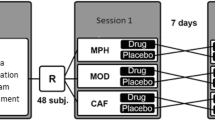Summary
The fundamental purpose of this experiment was to obtain empiric, replicatable, dose-response data from human subjects on the psychological effects of a common psychoactive drug. Six normal humans were first trained for six sessions on a series of tasks involving different aspects of memory and attention. Their individual sensitivity to secobarbital was also determined. After training, they were tested at zero and three levels of drug on a doubleblind basis. The drug levels for a given subject were selected so that the highest level was just under that which would make the subject untestable. The four point dose-response curves were replicated three times for each subject.
Some of the tasks performed by the subjects were affected by the drug in the expected manner as related to dose. Some tasks were unaffected by the drug. In no case were there drug effects which did not follow a regular dose-response curve. In all cases the dose-response curves for an individual subject were replicable.
The data from the experiment were interpreted as evidence for an effort stress effect inherent in some tasks. When the demand load of the tests was great, even very high doses of secobarbital had no effect. When the demand load of a task was lower, a dose related drug action was obtained.
Some questions were raised by the data on the generality of the Mirsky-Kornetsky hypothesis as to the differential effects of barbiturates on the CPT and the DSST at all dose ranges.
Finally, additional evidence was added to the position that a common effect of intoxicating chemicals is to produce a less differentiated, i.e., simpler, mental structure.
Similar content being viewed by others
References
Berry, C.: Effects of a drug on immediate memory. Nature (Lond.) 207, 1012 (1965).
Cattell, R. B.: The dimensional (unitary-component) measurement of anxiety, excitement, effort stress, and other mood reaction patterns. In: Drugs and Behavior. Uhr, L., and J. G. Miller (Eds.). New York: John Wiley 1960.
Davis, K. E., R. J. Comtois, and W. O. Evans: Dose and repeated experience effects of a sedative-intoxicant (secobarbital) on subjective states in the normal human. (In preparation.)
—, and J. S. Gillis: The effects of amphetamine and chlorpromazine on cognitive skills and feelings in normal adult males. In: The psychopharmacology of the normal human. Evans, W. O., and N. S. Kline (Eds.). Springfield, Ill.: Ch. C. Thomas 1968.
Evans, W. O.: The psychopharmacology of the normal human: Trends in research strategy. In: Psychopharmacology, 1967. Cole, J., and D. Efron (Eds.). Government Printing Office, Washington, D.C. 1968.
R. P. Carson, and J. L. Shields: The effect of high terrestrial environment on two different types of intellectual functioning. Report of U.S. Army Research Institute of Environmental Medicine Symposium on High Terrestrial Altitude, Natick, Mass. 1968.
Everrett, G. M.: Pharmacological aspects of clinical psychotropic drug studies: A critique on the dose-response problem. In: Psychopharmacology, 1967. Cole, J., and D. Efron (Eds.). Government Printing Office, Washington, D.C. 1968.
Hurst, P. M., R. Radlow, and S. K. Bagley: Drug effects upon data processing as a function of storage and retrieval parameters. Report No. ONR-H-67-2. Institute for Research, State College, Pennsylvania 1968.
Lienert, G. A.: Changes in factor structure of intelligence tests produced by d-lysergic acid diethylamide (LSD). In: Neuropsychopharmacology. Bradley, P. (Ed.). Amsterdam: Elsevier 1959.
—: Mental age regression induced by lysergic acid diethylamide. J. Psychol. 66, 3–11 (1966).
Melton, A. W., and J. McQ. Irwin: The influence of dregee of interpolated learning on retroactive inhibition and overt transfer of specific responses. Amer. J. Psychol. 53, 173–203 (1940).
Mirsky, A. F., and C. Kornetsky: On the dissimilar effects of drugs on the digit symbol substitution and continuous performance tests. Psychopharmacologia (Berl.) 5, 161–177 (1964).
Murdock, B. B., Jr.: The immediate retention of unrelated words. J. exp. Psychol. 64, 222–234 (1960).
Pollack, I., L. B. Johnson, and R. R. Knoff: Running memory span. J. exp. Psychol. 57, 137–146 (1959).
Postman, L., and P. A. Adams: Studies in incidental learning: IV. The interaction of orienting tasks and stimulus material. J. exp. Psychol. 51, 329–333 (1956).
Quarton, G. C., and G. A. Talland: The effects of methamphetamine and pentobarbital on two measures of attention. Psychopharmacologia (Berl.) 3, 66–71 (1962).
Talland, G. A., and G. C. Quarton: The effects of methamphetamine and pentobarbital on the running memory span. Psychopharmacologia (Berl.) 7, 379–382 (1965).
Underwood, B. J.: Proactive inhibition as a function of time and degree of prior learning. J. exp. Psychol. 39, 24–34 (1949).
—: Interference and forgetting. In: Human learning and memory (N. J. Slamecka, Ed.). London: Oxford University Press 1967.
Waugh, N.: Free versus serial recall. J. exp. Psychol. 62, 496–502 (1961).
Author information
Authors and Affiliations
Additional information
The authors would like to thank Dr. Allan Mirsky for his critical review of this manuscript.
Rights and permissions
About this article
Cite this article
Evans, W.O., Davis, K.E. Dose-response effects of secobarbital on human memory. Psychopharmacologia 14, 46–61 (1969). https://doi.org/10.1007/BF00401534
Received:
Revised:
Issue Date:
DOI: https://doi.org/10.1007/BF00401534




